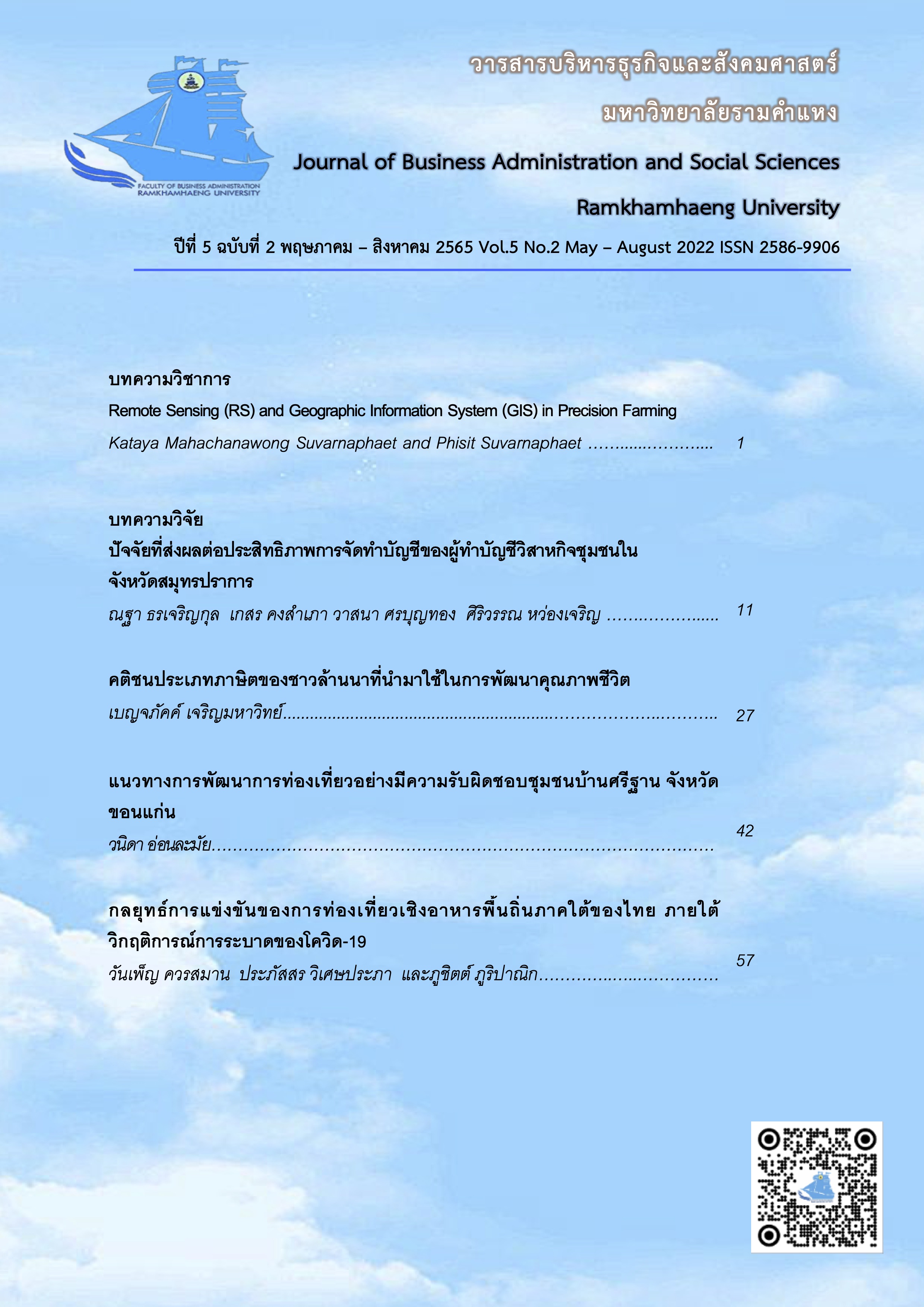Guidelines for the Development of Responsible Tourism at Ban Si Than Community, Khon Kaen Province
Main Article Content
Abstract
In this research investigation, the researcher examines the components of tourism at Ban Si Than Community, Khon Kaen province and proposes guidelines for the development of responsible tourism at the community under study. The qualitative research was conducted using the technique of in-depth interview with seventeen key informants from public agencies, private agencies, and residents in the area. The technique of focus group discussion with twelve subjects from all related agencies was also conducted. Findings showed that the guidelines for development consisted of four dimensions. 1. The environment dimension: The level of responsible tourism activities should be raised with a focus on activities in the aspect of the environment connecting the cultural learning process. 2. The political dimension: A community-based tourism committee should be established in a concrete manner to be a good host and to create tourism activities. All related agencies should support knowledge, process, and budget for continuous community development. This will enable the community to be strong and able to operate tourism activities by themselves. 3. The social and cultural dimension: Tourism programs that foster experience to tourists should be created by connecting such activities as offering food to the monks on the merit-making route; the nature trail at Chom Si Temple; cycling to study community lifeways; and waste sorting at Ban Si Than School in accordance with the 3R principle. 4. The economic dimension: The level of existing community souvenirs should be raised to be outstanding through the process of community product development in order to foster the local community economy. The community should be established as a community enterprise to conduct community-based tourism in a complete manner.
Article Details

This work is licensed under a Creative Commons Attribution-NonCommercial-NoDerivatives 4.0 International License.
เนื้อหาและข้อมูลในบทความที่ลงตีพิมพ์ในวารสารบริหารธุรกิจและสังคมศาสตร์ มหาวิทยาลัยรามคำแหง ถือเป็นข้อคิดเห็นและความรับผิดชอบของผู้เขียนบทความโดยตรง ซึ่งกองบรรณาธิการไม่จำเป็นต้องเห็นด้วย หรือร่วมรับผิดชอบใดๆ
บทความ ข้อมูล เนื้อหา รูปภาพ ฯลฯ ที่ได้รับการตีพิมพ์ในวารสารบริหารธุรกิจและสังคมศาสตร์ มหาวิทยาลัยรามคำแหง ถือเป็นลิขสิทธิ์ของวารสารบริหารธุรกิจและสังคมศาสตร์ มหาวิทยาลัยรามคำแหง หากบุคคลหรือหน่วยงานใดต้องการนำบทความทั้งหมดหรือส่วนหนึ่งส่วนใดไปเผยแพร่ต่อ หรือเพื่อกระทำการใดๆ จะต้องได้รับอนุญาตเป็นลายลักษณ์อักษรจากวารสารบริหารธุรกิจและสังคมศาสตร์ มหาวิทยาลัยรามคำแหง ก่อนเท่านั้น
References
การท่องเที่ยวแห่งประเทศไทย. (2564). 9 แนวโน้มใหม่ในอนาคตการท่องเที่ยว. สืบค้นจาก https://api.tourismthailand.org/ upload/live/content_article_file/20603-15378.pdf
ชื่นนภา นิลสนธิ. (2559). การท่องเที่ยวเชิงสุขภาวะด้านการพัฒนาการฟื้นฟูจิตวิญญาณ: ปัจจัยแรงจูงใจที่มีอิทธิพลต่อความพึงพอใจและการตั้งใจกลับมาท่องเที่ยวซ้ำกรณีศึกษาจังหวัดเชียงใหม่, วิทยานิพนธ์ปริญญามหาบัณฑิต สถาบันบัณฑิตพัฒนบริหารศาสตร์; กรุงเทพ.
เทิดชาย ช่วยบำรุง. (2552). วาระแห่งชาติเพื่อการพัฒนาและจัดการ การท่องเที่ยวสู่การพัฒนาเศรษฐกิจและสังคมอย่างยั่งยืน ปี 2552. สถาบันวิจัยเพื่อพัฒนาการท่องเที่ยว: กรุงเทพฯ.
ธนะวิทย์ เพียรดี และวนิดา อ่อนละมัย. (2564). แนวทางการพัฒนาการท่องเที่ยวโดยชุมชนไปสู่แหล่งท่องเที่ยวสีเขียวอย่างมีความรับผิดชอบ กรณีศึกษาบ้านเกาะเคี่ยม ตำบลกันตังใต้ อำเภอกันตัง จังหวัดตรัง. วารสารรัฐศาสตร์ มหาวิทยาลัยราชภัฏสวนสุนันทา, 4(1), 24-38.
ปทุมพร แก้วคำ, นำขวัญ วงศ์ประทุม, อุทุมพร การเก็บ, ศิรินพรรณ ชุ่มอินทจักร, มุกดา นัยวัฒน์ และบวรพจน์ หิรัญยรัศมีกุล. (2561). การจัดการท่องเที่ยวโดยชุมชนบ้านฮ่องแฮ่ Community Based Tourism Management Baan Hong Hae. วารสารวิทยาลัยดุสิตธานี, 12(3), 133-149.
แผนงานสื่อศิลปวัฒนธรรมสร้างเสริมสุขภาพ. (2560). สืบค้นเมืองเก่า บ้านเราศรีฐาน. สืบค้นจาก http://www.artculture4health.com/contents/view/775.
พจนา สอนศรี. (2546). คู่มือการจัดการท่องเที่ยวโดยชมชน. กรุงเทพฯ : โครงการท่องเที่ยวเพื่อชีวิตและธรรมชาติ.
วนิดา อ่อนละมัย. (2563). แนวทางการพัฒนาการท่องเที่ยวอย่างมีความรับผิดชอบ ชุมชนบ้านสาวะถี จังหวัดขอนแก่น. สืบค้นจาก https://so04.tci-thaijo.org/index.php/JSTD/article/view/254915.
วิชสุดา ร้อยพิลา และปรีดา ไชยา. (2558). องค์ประกอบของทรัพยากรการท่องเที่ยวที่มีต่อการท่องเที่ยวเชิงสร้างสรรค์ในจังหวัดกาฬสินธุ์. วารสารวิจัยและพัฒนาวไลยอลงกรณ์ ในพระบรมราชูปถัมภ์ สาขามนุษยศาสตร์และสังคมศาสตร์, 10(3), 197-211.
สุดถนอม ตันเจริญ (2560). การจัดการการท่องเที่ยวโดยชุมชนเพื่อการพัฒนาการท่องเที่ยวอย่างยั่งยืน. การประชุมวิชาการระดับชาติด้านการจัดการ คณะวิทยาการจัดการ มหาวิทยาลัยราชภัฏบ้านสมเด็จเจ้าพระยา ครั้งที่ 1 (16 มิถุนายน 2560).
สำนักงานสภาพัฒนาเศรษฐกิจและสังคมแห่งชาติ (2563). ยุทธศาสตร์ชาติ. สืบค้นจาก http://nscr. nesdb.go.th/wp-content/uploads/2020/11/Dec20_full_v2.pdf.
สมาคมท่องเที่ยวไทยอย่างมีความรับผิดชอบ. (2562). การท่องเที่ยวอย่างรับผิดชอบ (Responsible Tourism). สืบค้นจาก https://www.th.thairt.org/
หน่วยอนุรักษ์สิ่งแวดล้อมธรรมชาติและศิลปกรรมท้องถิ่นจังหวัดขอนแก่น. (2564). แหล่งโบราณคดีศรีฐาน (วัดจอมศรี). สืบค้นจาก https://culturalenvi.onep.go.th/site/detail/1315
Boniface, B. G., & Cooper, C. (1994). The Geography of Travel & Tourism (2nd ed.). Oxford: Bath Press, Avon.
Bookingholdings.com. (2022). Sustainable Travel. สืบค้นจาก https://www.bookingholdings.com /sustainability/sustainable-travel/.
Buhalis, D. (2000). Marketing the competitive destination in the future. Tourism Management. 21, 97-116. doi:10.1016/S0261-5177(99)00095-3
Dickman, S. (1997). Tourism: An Introductory Text. Sydney: Hodder Education.
Pike, S. D. (2008). Destination Marketing: an integrated marketing communication approach. Burlington, MA: Butterworth-Heinmann.


